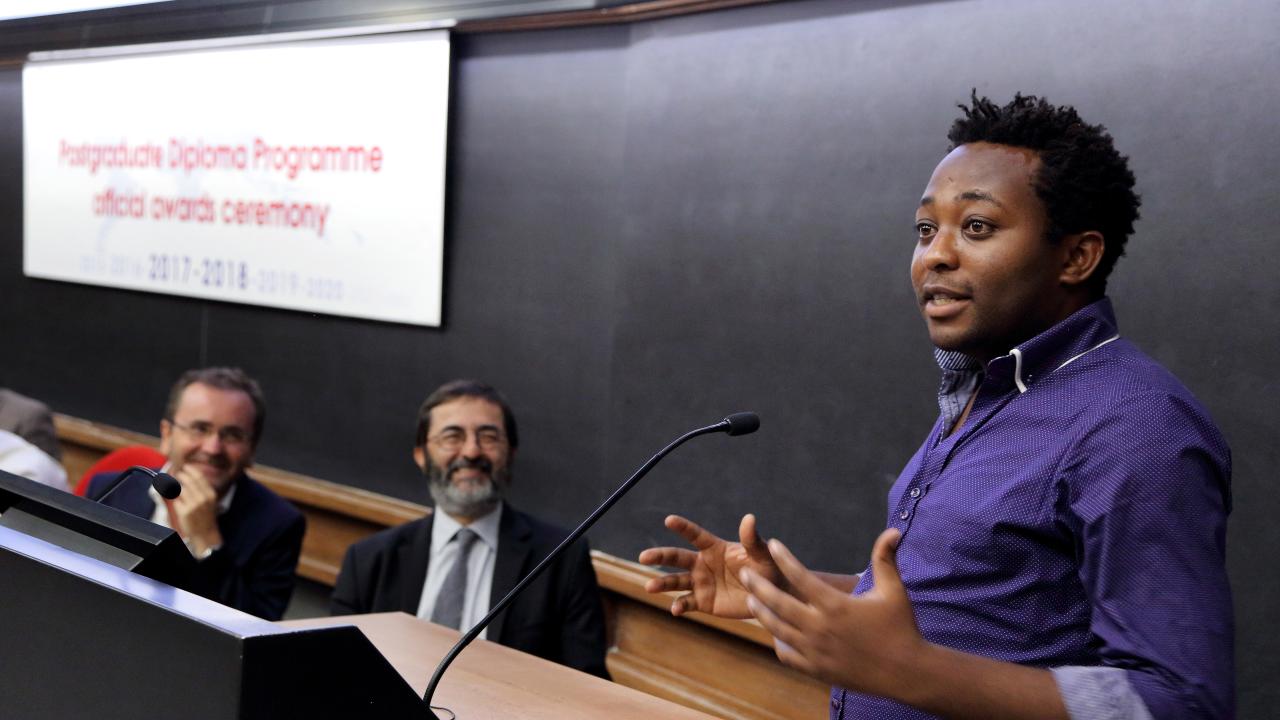
Doing stellar research is not the only way that ICTP alumni are using their talents and training, as demonstrated by the many successful alumni who gathered at the 30th Anniversary of the Diploma Programme. Stéphane Kenmoe is one of those alumni, a Cameroonian physicist who is not only a materials science researcher, but also works to integrate science and scientists into the broader society. "We are living in a society where, not only Africans but also all over the world, scientists are disconnected from society, from decision makers," says Kenmoe. The need to make connections inspired Kenmoe to start the Making Science the Star project.
Making Science the Star was recently selected as one of the twenty winners of the 2021 Falling Walls Engage competition. "People can submit applications to this competition to find a synergy with people doing great things all over the world," says Kenmoe. "Making science the star is my motto, and the title of the project that brings together film stars, scientists, decision makers, and the public."
The Falling Walls platform shares Kenmoe's goals, as a group that gathers leaders from the worlds of science, business, politics, the arts and society. The organization's Engage platform highlights projects that aim to engage the public with science, with an annual competition. "Our core vision is that a better understanding and public involvement in science can help tackle global societal challenges," says the Falling Walls website, "through fact-based decision-making, and contribute to the overall wellbeing of our society." Out of hundreds of applications, Making Science the Star was selected as one of the twenty winners who will present at the Falling Walls Summit conference in November.
Making Science the Star was inspired by Kenmoe's experience with the attitude towards science in Cameroon and other countries in Africa. "All developing countries have something in common, a serious lack of scientific culture," says Kenmoe. "I have been involved in contributing to build the scientific culture in the continent where I come from, Africa. It's important because Africa contributes only about 2-3% of the worldwide scientific production of research. It's not because excellent African scientists from these places are missing, they are spread all over the world. What's missing is an energy to connect scientists and the decision makers locally, to take the right decision, the right policy, that can create good conditions for these scientists and also align the research with the local needs. This energy that is missing, is the scientific culture."
Inspired by the astrophysicist and TV host Neil DeGrasse Tyson and a realisation that many people watch more video than they read, Kenmoe started doing TV appearances in Cameroon where he discussed science in everyday life. From there, he focused on getting celebrities involved in science and advocating science. "Many celebrities have huge followings on social media, they can reach a lot of people," says Kenmoe. "Going on TV was for me a way to get the momentum going, and now young people are opening science YouTube channels and going on TV themselves, and I'm proud of this."
The Making Science the Star team's latest project is a TV show, in French and English, that celebrates how science is everywhere in everyday life, called Science in the City. It is the adaptation of a fictional work aimed at popularising science titled ‘La science illumine Ndjocka-City’ ('Science Illuminates Ndjocka-City' in English) which Kenmoe published in 2019 with Binam Editions in France. "We show how science is perceived in Africa, but also show the triumph of novelty ideas, because at the end science is the star," says Kenmoe. "It shows the story of a young guy who comes back from abroad and opens a bar, but who also makes money by using his initiative and knowledge of science," Kenmoe explains. "We talk about how to transform biomass, about health, about plastic recycling, we talk about so many things, but all subjects we tackle are based on physical principles."
"For example, there is an episode where we talk about fish scales, which have piezoelectric properties, meaning electricity is generated when you press on them, thanks to the fibers of collagen that are inside the fish scales." In Africa fish scales are everywhere, Kenmoe explains, and people usually feed them to cats. The plot of the episode follows a character who recycles all the fish scales in the city to produce fibers of collagen, to make nanoimplants for heart diseases, like a nanogenerator to help regulate the heart's electricity. "People don't know what he's doing, taking the fish scales back home," says Kenmoe. "They think it's sorcery, but he has a very big success."
Many events the Making Science the Star team organises include screenings of the show followed by discussion with the audience, or meetings with national scientific advisors. A recent event in the Democratic Republic of Congo featured not only an engineer signing autographs for an excited group of students after a screening, but also a meeting with a high level governmental scientific advisor.
"We want to repair the African opinion about what is coming tomorrow, because if you don't think that the technology of tomorrow is the basic science we do presently, you will always be underdeveloped or in development," Kenmoe explains. "Innovation is also taking from your local environment, adapting it to your local needs, and then developing it into something that can be beneficial to your country." The Falling Walls award for Making Science the Star spotlights the creative work towards a more connected world, with no walls between decision makers and scientists.
---- Kelsey Calhoun
















